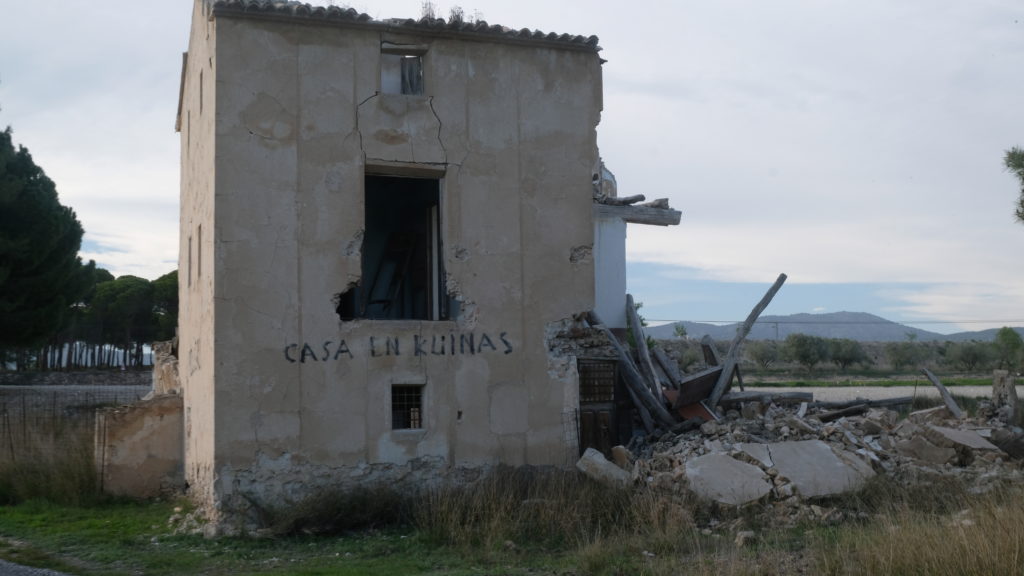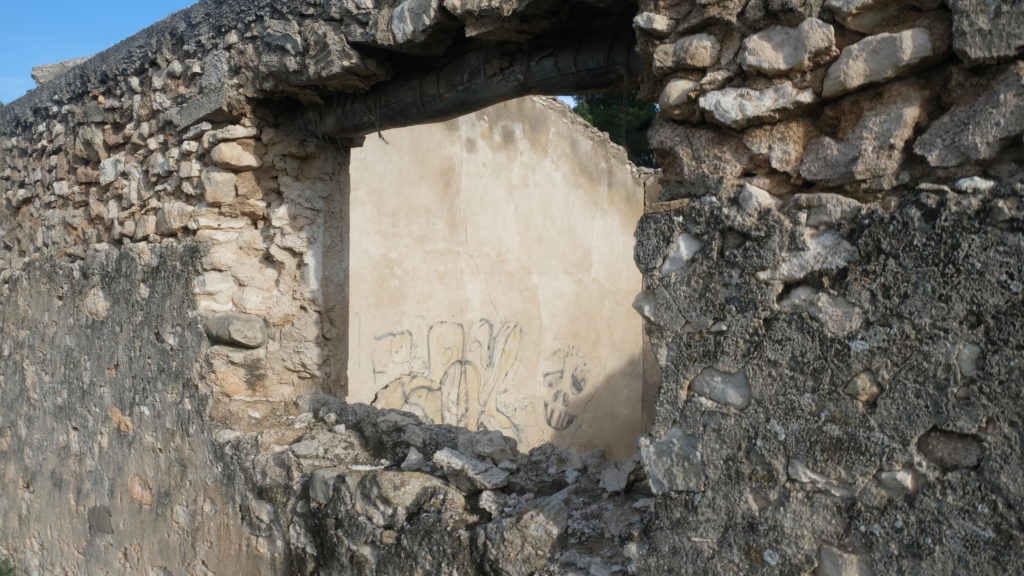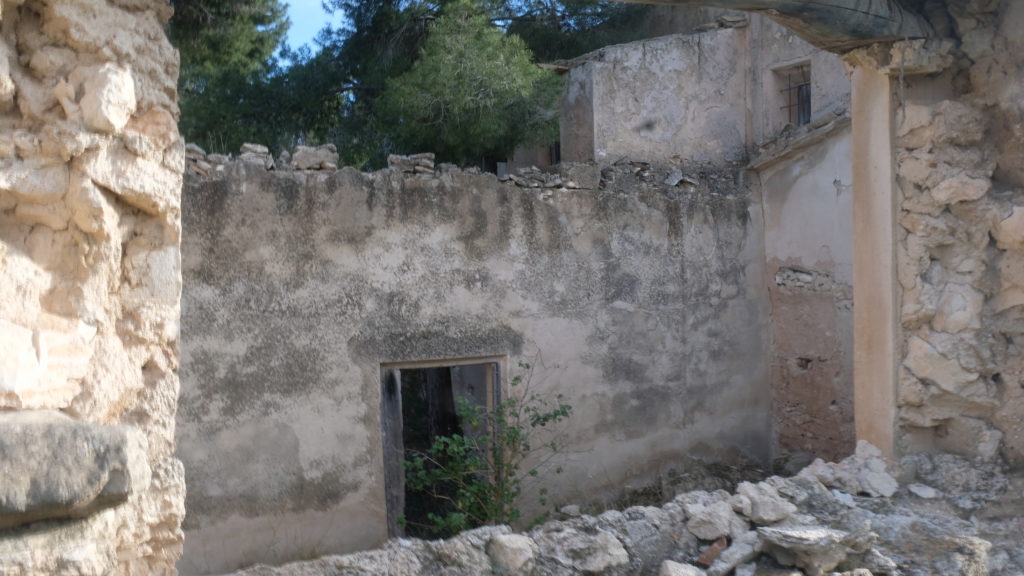Emptiness: the view from Spain
DOI: 10.60650/EMPTINESS-0Y2A-YD74
(See a response by the Emptiness project team here.)
Dace Dzenovska’s ‘Emptiness’ project is suggestive, promising, timely. The phenomenon is real, pressing, and dramatically evident. It is also unashamedly post-Soviet, with all the consequences which come in its train. The communities studied by her team were transited, rapidly, from one grand scheme, communism, to another, capitalism. Outsiders interpret locals’ predicament in the overarching terms of these very broad ideologies. At the same time, and because of this hasty switch, there is no obvious future for the emptied places she and her colleagues study: only further desolation, fewer people, and crumbling homes. They’re fit fodder for the unfortunately ever-more popular ‘ruination porn’: the domestic detritus of abandoned homes, rotting barns, roofless churches with trees as their congregation, and once-grand palaces humbled by neglect: uninhabited places overfilled with ghosts. Dzenovska states on her ‘Emptiness’ website that she wishes to move ‘emptiness in all its empirical richness horizontally. Fieldwork might yield insights about different emic interpretive frameworks, and we welcome them’.[1]‘How to study it’, Emptiness website. Available at https://emptiness.eu/how-to-study-it/ (accessed 7 Mar 2022) Here, I respond to her generous invitation, with a very contrastive example: contemporary Spain. My question is: will her ‘portable analytic’ survive the transcontinental journey?

Spain has not become empty. It always was empty. For centuries very low population densities have characterised its rural interior: a mix of mountains and a high plateau. Poor soils, lack of industry, and bitterly cold winters all play their part here. The rain might stay on the plain but many people, when they could, got out. This was known, and endured. It was not a major topic of conversation, in cities or villages but rather, a fact of national life, to be noticed, then passed over.
What did change common perceptions was the publication of an elegant but erudite essay. La España Vacía, ‘Empty Spain’(del Molino 2016), became the sensation of its publishing year, an unexpected bestseller. Its author, the learned journalist Sergio del Molino, makes his central axis the persistent emptying of the interior and the ways this has influenced writers’ views, over the generations, of rurality. But, once powerfully condensed into a persuasive book with a memorable title, ‘Empty Spain’ became a current issue of its day, an excuse for authors to make a quick tour of near-abandoned hamlets and, most importantly for our interests, a much-disputed term focussing political debate. One rapid response by opinion-makers was criticism of the label itself (e.g. Lenoir 2020). ‘Empty Spain’ was too abstract, devoid of agency, as though sustained rural depopulation was a somehow inevitable process, unaffected by different factors at different times. For rural emigration is not a simple unitary phenomenon but a complex series of mobilities in concrete times and spaces, intersected by class, age, gender, levels of education, employment opportunities, etc. In particular, critics cited the massive shifts in population stimulated by Francoist policies of belated but rapid industrialisation and his government’s boosting of a tourist economy. On this reading, Spain was not ‘empty’; it was ‘emptied’, directly, thanks to the desires of a modernising dictatorship: La España Vacíada, not La España Vacía. Angry hunters, farmers, and livestockmen went further: in Spring 2022, their tractors blocked roads to protest ‘La España VaciLada’ (from vacilar, to be unstable, on point of collapse, indecisive, laughed at).

A separate factor took the debate to the very centre of national politics. Since the transition to democracy following Franco’s death in 1975 onwards, Spain was usually governed by an alternating system, with either the centre-right Partido Popular (PP) or the centre-left Partido Socialista Obrero Español (PSOE) in power, with powerful nationalist groups in the Basque Country and Catalonia lobbying from the side-wings. In recent years this duopoly has begun to fragment. The rise, from 2014 onwards, of a committed left-wing party, Podemos (‘We can’), initially very popular, seriously eroded PSOE’s domination of the national left. At the same time, the creation of a centrist party, Ciudadanos (‘Citizens’) in 2006 and a solidly right-wing party, Vox (‘Voice’) in 2013, has similarly taken a sizeable proportion of votes from the PP, while Catalan nationalism has grown in strength and determination. The sum result is that today, more than ever, both PSOE and the PP need to form complex coalitions with other parties to rule the country. This fracturing of the political spectrum can give disproportionate influence to tiny parties.
In October 2019 a strike was called in 20 Spanish provinces to protest successive governments’ lack of concern for La España Vacíada. Its level of participation was so high it emboldened a regional grouping, in Teruel (the most severely depopulated province of all Spain), to stand in the national elections, held the next month. A single candidate for Teruel Existe (Teruel Exists) was voted in as a deputy to the national parliament. By aligning with the socialists, he enabled them to form a government, with an absolute majority of one. He was then appointed to lead the newly formed Ministry for Demographic Challenge.
In turn, this electoral success has encouraged other regionalist or provincialist groupings to present candidates for regional assemblies. In February 2022 in a snap election called for the autonomous community of Castile and León, a regional party, Soria ¡Ya! (‘Soria Now!’), won over 42% of the vote and thus the majority of Sorian procuradores to the regional assembly. A series of parties in other provinces of Castile and León are at this moment forming. The ultimate aim of these groupings is to form a national platform, contesting national elections. At the same time, PP had performed so disappointingly, compared to the success of Soria Now!, that its national leader was forced to resign. Such is the electoral heft of localist parties, what critics call ‘the tyranny of minorities’.
Of course, different parties have their own ideas of what ‘Emptied Spain’ means, and how to solve its perceived deficiencies. Regionalists speak in concrete regionalist terms, of ‘100/30/30’: i.e. every part of Spain should enjoy 100Mbts of digital access; should be within 30 minutes’ drive of a high school, a health centre, and a police station; should have within 30 kilometres’ distance a dual carriageway. PSOE, remembering its socialist origins, speaks of ‘social justice’ and ‘territorial cohesion’ imperilled by multiple ‘imbalances’, in grave need of adjustment. Podemos, as self-appointed standard-bearer of the left, crabs planned ‘macro-ranches’ and calls for the creation of empleo digno, ‘real jobs’. Ciudadanos, as moderate centrists, opt for economic revitalisation: kickstarting repopulation is better than putting the brakes on depopulation. PP, unlike other parties, supports macro-ranches, and pleads caution on decentralisation: it does not support the shift of government departments from Madrid to rural towns.
The trump card of the regionalists is that they are locals, engaging with local problems. They are not ‘electoral tourists’ touring towns on the hustings and throwing promises like confetti, nor are they local businessmen exploiting the voting power of long-established clientelism. Instead, they support small-scale farmers and low-level entrepreneurs, as that’s what many of them are.
Here, ‘the emptying of the countryside’ has become so dominant a theme in political discussion, it acts to exclude other, central dimensions of life in Castile and León. During the electoral campaign, it was left to journalists, reacting to the silence of politicians, to point out that the region had in fact well-developed technology centres. Indeed the region came sixth in a national scale of cultural innovation and research. But such facts did not square with the image the candidates were purveying. It would have lessened their laments of depopulation’s ills.
Further indices of the weight of ‘Emptied Spain’ and its move to the centre-ground of national politics are the newly instituted cross-party roundtables held by governors of rural regions. In the same room provincial leaders from PP, PSOE, and Ciudadanos will sit down together to debate how to recalibrate the division of national spoils. They propound a logic of distribution which recognises the special costs of compensating for depopulation (dedicated transport for pupils, the ailing, etc.), instead of relying on per capita calculations which greatly favour areas of concentrations: i.e. large cities. They might vie with venom come the hustings, but outside of electoral periods, they acknowledge the collective need to tackle national economic and social priorities. In these various ways, ‘Emptied Spain’ has become an integral, lively part of the nation’s agorae, from parliament to village plazas. Indeed the debate is so central, and so powerful, it’s restructuring the country’s politics, fuelling new parties at all levels, and stimulating previously unthinkable alliances. It also emboldens locals, turning them into activist citizens protesting, say, the threatened implantation of macro-ranches or ginormous solar farms. Concern is now so general among the populace that the grouping ‘La España Vacíada’ is planning to open branches in Madrid and Barcelona, to rally those city dwellers it knows are sympathetic. Here, ‘the emptied’ transcends its place of origin, uniting the rural and the urban and, with the social media, reconfiguring both in the process.

In 2020 Dzenovska asked me, “Jeremy, what is the role of nationalism within ‘Empty Spain’?”. I said I wasn’t too sure. Today, I’ve a better idea. Local pundits state that Franco’s desire for realising his dream of Spanish nationalism, and at moments even of Spanish imperialism, was so strong, so sustained, that almost any praising of the phenomenon these days is tainted with the tar brush of dictatorship. Many politicians prefer to laud el país, ‘the country’. PSOE does not speak of ‘the nation’ but of ‘the territory’. The various ethnonationalists, Basque, Catalan, Galician, etc., do of course speak openly of ‘the nation’, but only so as to attack the established nation-state and eulogise their own territorial grouping. Sergio del Molino reports that the only time he heard a Podemos leader speak forcefully of the issue was during a 2019 electoral campaign when ‘Emptied Spain’ had become a common concern for all candidates. Seemingly goaded into reaction by a pack of ultranationalist hecklers, the leader improvised such a fluent, rapid defence of a popular ‘Spain’, threatened by pillaging capitalists, that del Molino judged he’d witnessed the staging of a studied spontaneity (del Molino 2022: 16-17). The performance was not repeated elsewhere. The only party which does openly espouse Spanish nationalism is Vox which, as a resolute right-wing organisation, campaigns for recentralisation, opposes all regional assemblies, and strongly defends the unity of the country. But even Vox shies from Francoist excess.
***
Let us go back to the beginning. Is ‘emptiness’ a portable analytic? Yes, if you think a suitcase is the same as a rucksack.
I like to think the case of rural Spain highlights just how culturally particular the rural condition is in post-Soviet spaces. The blogs already on this website suggest a stasis, a lack of a productive future, a result of failed macro-level policies. They give little hint of attempts, at any level, to revitalise areas and banish a sense of emptiness. The remaining residents are doomed, the horizon dark.
Could contemporary Spain be more different? Regional and national newspapers fill their pages with article after article on revivifying efforts: adventurous new businesses, optimistic platforms, arts initiatives, the latest kind of rural immigrants, etc. I entitled an earlier article on the topic, ‘An empty Spain filled with ideas’ (MacClancy 2020). So many places are being repopulated, some successfully, that ex-urbanites making the move are tired of being exoticised: ‘We are citizens, not heroes or pioneers’ (del Molino 2022). Moreover, Spain, unlike the seemingly monolithic states in post-socialist zones, is deeply confederal. Some outsiders are surprised at the degrees of autonomy granted to different political levels, from the regional to the municipal: mayors of even small towns can wield significant executive power. One consequence is that initiatives, whether to promote planned change or to protest against greedy outsiders’ interventions, may arise at any level and gain traction quickly. In this context, almost no one need be ‘forgotten’, for those who raise their voice may well win a hearing.
Dzenovska sees ‘emptiness’ as tripartite[2]‘What is it’, Emptiness website. Available at https://emptiness.eu/what-is-it/ (accessed 8 Feb 2022) : (1) It’s an ‘observable reality’: yes but not one of ‘seemingly irreversible’ decline, as she portrays the post-Sovietscape. To give one example, the government of Navarre, a northern province, is successfully combatting, albeit in a patchy manner, depopulation by providing fast broadband for all its residents, however distant they be from its capital, Pamplona. (2) It’s a ‘way of life (practices and social relations)’: yes, but not one where ‘residents attempt to make life go on’ (my emphasis) rather, one where many actively engage in co-creating a better future. (3) It’s an ‘emic interpretive frame’ locals use to comprehend the new reality: yes, but not one which they have accepted in a resigned manner. Instead, it is one which they have made their own, by criticising the emptiness of ‘La España Vacía’, for the fullness of ‘La España Vacíada’, a far more agentive agenda alive to the specificities of time, place, and politics.
‘All that is solid melts into air’. Marx’s dictum is all too tragically true for the postsocialist states. The difference is that in rural Spain many are actively trying to forge a new solidity. And some are succeeding.
This is an Open Access article, distributed under the terms of the CC-BY (Creative Commons Attribution 4.0 International) licence, which permits unrestricted re-use, distribution, and reproduction in any medium, provided the original work is properly cited.
Footnotes
| ↑1 | ‘How to study it’, Emptiness website. Available at https://emptiness.eu/how-to-study-it/ (accessed 7 Mar 2022) |
|---|---|
| ↑2 | ‘What is it’, Emptiness website. Available at https://emptiness.eu/what-is-it/ (accessed 8 Feb 2022) |